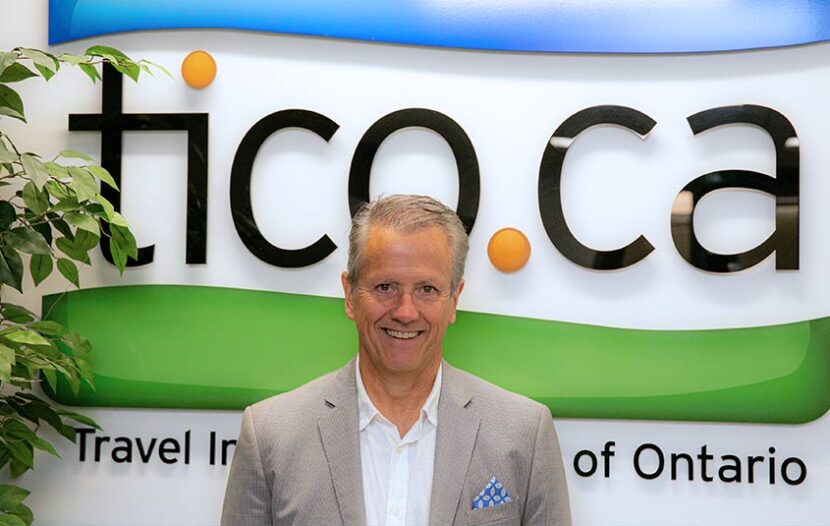TORONTO — Get rid of the Comp Fund?
It’s quite a concept, but it’s one of many options that TICO says it’s willing to look at in the pursuit of finding the best framework for supporting Ontario travel industry registrants and consumers.
As reported yesterday – along with news that registrant fees are on their way back after a three-year hiatus – TICO has embarked on a process that includes an end-to-end look at TICO’s current funding framework, as well as a full review of the Compensation Fund. It’s the most comprehensive review in TICO’s 25-year history.
And as TICO President and CEO Richard Smart told the trade media in an update yesterday, “all options are on the table.”

TICO Stakeholder Relations Manager Kristina Wilson (left) and TICO President and CEO Richard Smart (right) at TICO’s update for the travel trade media, Sept. 22, 2022
IS THE BEST COMP FUND MODEL NO FUND AT ALL?
TICO has brought on consultant Optimus SBR for the review, with an eye to compiling a report to submit first to the TICO board by December 2022 / January 2023, with a final set of recommendations ready for the provincial government by early 2023.
The goal is to have a new funding model in place by fall 2023.
From the sounds of things, no stone will go unturned. That’s especially true of the Comp Fund, which now stands at $23.5 million. The Fund has been a mainstay of the Ontario travel industry for years and it’s a key part of TICO’s consumer-facing messaging. Travellers who don’t book through a TICO-registered travel retailer or wholesaler are out of luck if the company fails, or if a company fails to provide services for which the consumer paid.
But between insurance and credit card chargebacks, not to mention a thriving industry, claims on the Fund have been – relatively speaking – low for many years.
That was the case even during the pandemic, when the travel industry was devastated beyond anyone’s wildest imagination. In fiscal 2020/2021, claims paid totaled $3,388. In 2021/2022, there were $428,812 in claims. And year to date for fiscal 2022/2023, claims paid total $76,366.
During the pandemic, there were 480 registrant closures. The number of TICO registrants now stands at just over 2,000, reflecting a 20% reduction in the registrant base.
“We said, if we get through the pandemic and there aren’t a lot of claims on the Comp Fund, we need to ask ourselves, why is that?” said Smart.
As anyone working in the Ontario travel industry well knows, the Fund exists because of fees paid by travel retailers and wholesalers. It covers registrant failure as well as end-supplier failure including airlines and cruise lines. As Smart notes, end-supplier failure has long been a bone of contention, as airlines and cruise lines don’t pay into the Fund.
Over the course of its 25-year history TICO has facilitated just shy of $5 million in restitution, and paid out $14.8 million from the Fund, to assist 24,037 consumers.
“Compared to the number of people who travelled over those 25 years, that’s a drop in the bucket,” said Smart.
CONSUMER-PAY MODEL
Could the Fund disappear entirely? Even if TICO’s report to the Ontario government does include this route as an option, it’s just one of many possible outcomes, and any changes to the Travel Industry Act are ultimately up to the province.
Eliminating the Fund would also be a complete U-turn from calls in recent years for an even larger Comp Fund, with $40 – $60 million in reserve, based on a Deloitte study.
A consumer-pay model, like the one in Quebec’s travel industry, could bolster the Fund to those levels. The idea of a consumer-pay model has been a topic of discussion in the Ontario travel industry for years. “If I had a nickel for every time someone suggests a consumer-pay model like Quebec has, I’d be sitting on a beach somewhere right now,” said Smart.
As part of a process that started back in 2016 and 2017, TICO made a number of recommendations to Ontario’s then-Liberal government for changes to the Travel Industry Act. Many of those recommendations were implemented – but not the consumer-pay model.
“Going to the government and telling them we want to put into the legislation that the travel industry can charge a fee to travellers, to fund the Compensation Fund, like a tax? That’s a tall order. But we could do it,” said Smart.
In January 2020, just before the pandemic, industry groups including ACTA and CATO were voicing their frustration with the Comp Fund stalemate. At that time, both groups said it was clear that despite extensive lobbying efforts, the Ontario government did not intend to revise the funding model.
And then the pandemic hit, and everyone had other problems to worry about.
RISK-BASED MODEL ANOTHER OPTION
Another possibility for this 2022 go-round of recommendations from TICO? A risk-based funding model.
“A lot of regulators [in other industries] are trying to move to risk-based pricing” for registrant fees, said Smart yesterday.
With the risk-based approach, registrants who have a single product / single country business model, for example, would pay more in fees, because the lack of diversification in their product offering makes them more vulnerable to downturns.
Asked if Ontario retailers and wholesalers will be paying more in fees in 2023 and beyond, Smart said: “There are some registrants who should be paying more. And there are some who should be paying less. We hope to get to more of a risk-based model for the future.”
Smart told Travelweek he believes a risk-based model could work well in tandem with a consumer-pay model.
As announced yesterday, the fee model that’s coming back into place for Ontario retailers and wholesalers for 2023 is a familiar one for registrants. “We think the whole revenue fee model has to change. But we wanted to come back to a model that registrants understand,” after the three-year hiatus during the pandemic, when fees were waived, said Smart.
Ultimately – and this is where the Optimus review comes in – “we want to come up with a funding model that stands the test of time.”
TICO is currently grappling with the failure of Crystal Cruises. While the luxury cruise line has since been resuscitated by A&K Travel Group, many travellers are out of pocket after its initial demise. “We’ve had a large number of consumer claims come in for Crystal,” added Smart.
RECOVERY, SERVICE FEES, LICENSING & MORE
While the Comp Fund is always front and centre of any TICO discussion, there was plenty of other news yesterday from TICO.
The travel industry is steadily recovering from the pandemic, but Smart notes that in terms of revenues, TICO registrants “are 50 – 55% where we were pre-pandemic. On one hand, you would think the numbers should be way better”, given the sharp uptick in demand for travel over the past several months, said Smart. He noted that Ontario has a lot of smaller registrants who sell mostly winter sun product, and demand for those vacations are still in the months ahead. Travel agencies that do a lot of air bookings are way ahead of travel agencies that do mostly vacation packages.
In terms of recovery, “we’re modeling about 70% in 2023 versus pre-pandemic,” Smart added.
The rapid rise in demand for travel, and all the cancellations and air travel chaos that came with that, also had a knock-on effect for TICO.
Consumers are calling and emailing TICO with their air travel grievances, which TICO has nothing to do with.
And with a call centre “of just two people,” notes Smart with a smile, TICO was already handling thousands of enquiries before travel’s restart. “Our call volumes went up times five,” and the number of email enquiries went through the roof, he said.
In a typical year TICO resolves 150-200 written complaints, facilitates $75,000 in restitution for consumers and handles 1,500-2,500 phone and email enquiries.
In 2020-2021, TICO resolved 605 written complaints, facilitated $3,112,251 in restitution for consumers and handled 62,365 phone and email enquiries. Those numbers peaked in 2021 but were still high in 2021-2022.
From consumers, TICO’s hearing about ongoing challenges with travel vouchers, customer service challenges with long hold times, and the aforementioned airline complaints.
TICO also gets feedback from consumers about travel agent service fees.
While many in the industry would agree that the move to service fees has been one of the few positive outcomes of the pandemic, fees must be communicated clearly from the start of the booking process.
“I’m a firm believer that agents should be paid for their services. But the fees have to be explained at time of booking. You can’t change the rules when the game is in the sixth inning,” said Smart.
He added that the pandemic has underscored the value of travel agents, and that he feels there’s more of an opportunity now for a discussion about licensing, something that would come with continuing education.
From the travel industry, TICO is hearing about labour challenges and the near-impossible task these days of finding staff. It’s also fielding feedback about challenges in the broader travel ecosystem, i.e. wait times with suppliers, passport processing delays and more.
NEW ENTRANTS TO THE INDUSTRY
Smart also shared that TICO has seen a huge rise in the number of people taking the TICO exam. “We’ve seen a three-fold year over year increase in the number of people registering to take the exam,” he said.
TICO has produced a new series of four videos it plans to share with Ontario colleges, to inspire students to join the industry, with a website tico.ca/getstarted.
“It’s about showing that working in travel is exciting and engaging and rewarding,” says TICO’s Stakeholder Relations Manager, Kristina Wilson.
Meanwhile Smart says TICO is keeping a laser focus on its three priorities: “A commitment to a fair funding model; supporting the needs of registrants and consumers; and continuing to be prudent financially.”

